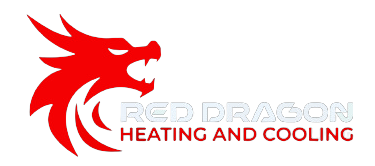- 518.348.9000
- [email protected]
- 117 Van Rd Gloversville,NY 12078
The Hidden Thief of Your Comfort and Cash: Your Ultimate Guide to Professional Duct Sealing in Fulton and Montgomery Counties
In your home, there’s a hidden network that’s critical to your comfort, yet it’s almost entirely out of sight: your ductwork. This system of channels is the highway that carries the cool, conditioned air from your A/C to every room in your house. But what if that highway is full of potholes and leaks? For countless homeowners in Gloversville, Johnstown, Broadalbin, Mayfield, Fonda, Amsterdam, and Northville, leaky ductwork is silently stealing their comfort and wasting their money. At Red Dragon Heating and Cooling, we are experts in identifying and eliminating this hidden problem through professional duct sealing, and we’ve created this guide to show you why it’s one of the most impactful home improvements you can make.
What is Duct Sealing and Why is it So Important?
Your duct system is a complex network of metal or flexible tubes that runs through your walls, ceilings, attic, and crawl spaces. Over time, the joints and seams in this network can loosen, separate, or become damaged. Professional duct sealing is the process of finding and sealing all of these leaks, ensuring that the air your A/C works so hard to cool gets delivered where it’s supposed to go, without escaping along the way.
According to the U.S. Department of Energy’s ENERGY STAR program, the typical home loses 20 to 30 percent of the air that moves through its duct system due to leaks, holes, and poor connections. Think about that: for every dollar you spend on cooling, 20 to 30 cents could be going to cool your attic, your crawl space, or the inside of your walls. This is a massive waste of energy and money.
The importance of duct sealing goes far beyond just saving money:
- Improved Comfort: Leaky ducts are a primary cause of uncomfortable rooms and uneven temperatures. If you have a room that’s always too hot in the summer, there’s a good chance a significant duct leak is to blame. By sealing the leaks, we ensure strong, consistent airflow to every room.
- Enhanced Energy Efficiency: When your ducts are sealed, your A/C doesn’t have to work as hard or run as long to cool your home. This can reduce the strain on your system and lower your summer electricity bills by as much as 20%.
- Better Indoor Air Quality: Leaky return ducts are particularly problematic. They can pull dirty, dusty, and unconditioned air from your attic, crawl space, or garage into your HVAC system and distribute it throughout your home. This can introduce dust, insulation particles, mold spores, and other contaminants into the air you breathe. Sealing these leaks is a critical step in improving your home’s indoor air quality.
- Increased HVAC System Lifespan: By reducing the workload on your A/C, duct sealing helps to minimize wear and tear on critical components like the compressor and blower motor. This can extend the life of your HVAC system and prevent premature failures.
- Improved Safety: During the heating season, leaky ducts can create a dangerous situation called “backdrafting,” where combustion gases from appliances like your furnace or water heater are pulled back into the living space instead of being vented outdoors. Sealing ducts helps to maintain proper pressure balances in your home and ensures safe operation of your appliances.
Signs You Might Have Leaky Ducts
Since most of your ductwork is hidden, how can you tell if you have a problem? Here are some of the most common signs:
- High Summer and Winter Utility Bills: If your energy bills seem unusually high, leaky ducts are a likely culprit.
- Rooms That Are Difficult to Cool or Heat: Do you have rooms that are always stuffy in the summer or chilly in the winter, no matter how you adjust the thermostat?
- Stuffy or Uncomfortable Rooms: If some rooms just never feel comfortable, it could be due to poor airflow from leaky ducts.
- Visible Tangles of Ductwork in Your Attic or Crawl Space: If you can see flexible ducts that are kinked, crushed, or torn, they are definitely not working efficiently.
- Excessive Dust: Do you find yourself dusting more often than you’d like? Leaky return ducts could be pulling in dust from your attic or crawl space.
The Red Dragon Duct Sealing Process: A Scientific Approach
Proper duct sealing is more than just slapping some tape on visible joints. At Red Dragon Heating and Cooling, we use a scientific and thorough process to ensure we find and seal every leak for maximum impact.
- System Inspection: We start with a visual inspection of all accessible ductwork in your attic, basement, or crawl space, looking for obvious disconnections, damage, or poor connections.
- Diagnostic Testing (Blower Door and Duct Blaster Test): This is what separates the professionals from the amateurs. We use a calibrated system to pressurize your entire duct network. This allows us to:
- Quantify the Leakage: We can measure exactly how much air your duct system is leaking, giving you a clear baseline before we start.
- Pinpoint the Leaks: While the system is pressurized, we can systematically move through your home to find the precise location of every leak, even those hidden deep inside walls and ceilings.
- Professional Sealing: We use a variety of professional-grade materials to seal the leaks, depending on their location and size. This includes using mastic sealant (a gummy, paint-on material that provides a durable, flexible seal), high-quality metal-backed tape, and other specialized products. We never use standard cloth-backed duct tape, as it is not approved for sealing ducts and will quickly dry out and fail.
- Post-Sealing Test: After we’ve sealed all the leaks, we perform the diagnostic test again. This allows us to verify the results of our work and show you exactly how much we’ve reduced the leakage. We aim to reduce duct leakage to an absolute minimum.
- Insulation (If Necessary): In many cases, ducts in unconditioned spaces like attics are also poorly insulated. After sealing, we can wrap the ducts in proper insulation to prevent heat gain in the summer and heat loss in the winter, further boosting your system’s efficiency.
Serving Our Communities: Sealing Ducts for Better Comfort Across Fulton and Montgomery Counties
Red Dragon Heating and Cooling is committed to improving the comfort, efficiency, and air quality of homes throughout our service area.
Gloversville and Johnstown: Improving Our Local Homes
In the many older and historic homes of Gloversville and Johnstown, original ductwork is often a major source of energy loss. Our professional duct sealing service can dramatically improve the comfort and efficiency of these beautiful homes without compromising their character.
Broadalbin: A Smart Investment for Every Home
Whether your home is a century old or just a decade old, duct leakage is a common problem. For homeowners in Broadalbin, duct sealing is a smart, cost-effective investment that pays for itself in energy savings and improved comfort.
Mayfield: Enhancing Your Lakeside Living
After a day on the Great Sacandaga Lake, you want to come home to a cool, comfortable house. If some rooms aren’t getting the airflow they need, leaky ducts are likely the cause. We can seal your system and ensure every room is an oasis.
Fonda: Better Air Quality for a Historic Village
In a village as rich in history as Fonda, many homes have ductwork running through old basements and attics. Sealing these ducts is crucial for preventing dust, mold, and other contaminants from being pulled into your living space.
Amsterdam: A Solution for Every Home Type
From multi-family buildings to single-family homes, every property with a forced-air system in Amsterdam can benefit from duct sealing. It’s a universal improvement that enhances any HVAC system’s performance.
Northville: Sealing in Comfort at the Gateway to the Adirondacks
For the homes and cottages in Northville, ensuring your HVAC system is running efficiently is key. Duct sealing is a foundational step to prevent wasting energy and to make sure your home is always ready for your return from a day of exploring.
The Financial and Environmental Impact
The benefits of duct sealing are not just about comfort; they are about tangible savings and responsible energy use. By preventing the loss of 20-30% of your conditioned air, you can expect to see a significant reduction in your monthly energy bills. For many homeowners, the investment in professional duct sealing pays for itself in just a few years.
From an environmental perspective, duct sealing is a powerful green upgrade. By reducing your energy consumption, you are also reducing your home’s carbon footprint, contributing to a healthier environment for the entire community.
Frequently Asked Questions About Duct Sealing
Q: Can I just use duct tape to seal my ducts?
A: Absolutely not. Despite its name, standard cloth-backed “duct tape” is not suitable for sealing ducts. It cannot withstand the temperature changes and will quickly become brittle and fall off. Professional sealing requires specialized materials like mastic and foil tape.
Q: How long does the duct sealing process take?
A: A thorough duct sealing job, including diagnostic testing, typically takes one full day.
Q: Is duct sealing a messy process?
A: No. Our technicians are respectful of your home. The sealing process is contained to the areas where your ductwork is located (attic, basement, etc.), and we ensure our work area is clean when we are finished.
Q: My house is brand new. Do I still need to worry about leaky ducts?
A: Unfortunately, yes. Even in new construction, duct installation can be rushed, and connections are often not properly sealed. We frequently find significant leakage in brand-new homes.
Stop Cooling Your Attic. Start Cooling Your Home.
If you’re tired of high energy bills, dusty air, and rooms that are never comfortable, it’s time to address the hidden culprit. Contact Red Dragon Heating and Cooling today to schedule a consultation for professional duct sealing. Let us show you how much comfort you’re losing and how much money you could be saving. It’s a simple, effective upgrade that will improve the performance of your HVAC system and the overall health of your home in Fulton or Montgomery County.
The Science Behind the Seal: How We Measure and Verify Our Work
At Red Dragon Heating and Cooling, we don’t just guess when it comes to duct sealing; we measure. Our process is based on the building science principles established by organizations like the Building Performance Institute (BPI). Here’s a more detailed look at our diagnostic and verification process.
Step 1: The Blower Door Test
Before we even look at your ducts, we often start with a blower door test. A powerful, calibrated fan is temporarily fitted into the frame of an exterior door. This fan either pressurizes or depressurizes the entire house. This test tells us how “leaky” your house is as a whole—how many air changes per hour (ACH) occur due to gaps in your home’s thermal envelope. This gives us a baseline for your home’s overall energy efficiency.
Step 2: The Duct Blaster® Test (Pre-Sealing)
This is the core of our duct leakage diagnosis. The process involves:
- Sealing the Vents: We temporarily seal all of the supply and return vents in your home with a special tape or adhesive film.
- Connecting the Duct Blaster: We connect a smaller, calibrated fan—the Duct Blaster—to your duct system, usually at the main return air grille.
- Pressurizing the System: The Duct Blaster fan is turned on, and it blows air into the sealed duct system, pressurizing it to a standard pressure (typically 25 Pascals).
- Measuring the Leakage: A pressure and airflow gauge connected to the fan tells us exactly how much air is leaking out of the duct system at that pressure. The leakage is measured in Cubic Feet per Minute (CFM). A high CFM number means you have very leaky ducts.
Step 3: Finding the Leaks
While the system is pressurized, it’s much easier to find the leaks. Air will be whistling or blowing out of every crack and poor connection. Our technicians will systematically go through your attic, basement, and crawlspace, feeling for these leaks and marking them. We also use tools like theatrical smoke pencils, which will visually show the air escaping from the leaks.
Step 4: The Sealing Process
Once all the leaks are identified, we begin the sealing process. Our choice of sealant is critical.
- Mastic Sealant: This is our primary tool. Mastic is a gooey, non-toxic, water-based sealant that is applied with a brush or a caulk gun. It’s spread liberally over every joint, seam, and connection in the metal ductwork. When it dries, it forms a thick, rubbery, and incredibly durable seal that remains flexible, so it won’t crack as the ducts expand and contract with temperature changes.
- Foil Tape: For certain applications, especially on the backing of insulation or on flexible ducts, we use a high-quality foil tape that is approved by Underwriters Laboratories (UL). This is not the same as the cheap foil tape you might find at a hardware store. It has a powerful, long-lasting adhesive designed for the temperature swings in a duct system.
We are meticulous in this process, sealing not just the main trunk lines but also the smaller branch lines and the “boots” where the ducts connect to the vents in your floors, walls, or ceilings.
Step 5: The Duct Blaster Test (Post-Sealing)
After the mastic has had time to set, we perform the Duct Blaster test again. This is the moment of truth. The post-sealing CFM number will be dramatically lower than the pre-sealing number. We can then show you, with verifiable data, exactly how much we’ve improved the integrity of your duct system. A reduction in leakage of 70%, 80%, or even 90% is common in older homes. This final test provides you with peace of mind and concrete proof of the value you’ve received.
The Impact of Duct Location
The location of your ductwork has a huge impact on how much energy you lose through leaks.
- Ducts in Conditioned Space: If your ducts run entirely within the conditioned envelope of your home (for example, in a sealed and insulated basement or between the floors of a two-story home), the energy penalty of leaks is lower. The leaked cool air is still inside your home’s thermal boundary.
- Ducts in Unconditioned Space: This is the most common and most problematic scenario. In most homes in our region, the ductwork runs through an unconditioned attic, crawl space, or garage. In the summer, your attic can reach temperatures of 130°F or more. When your cool, 55-degree air leaks out into this scorching environment, it’s a complete and total waste. Worse, leaks in the return ducts will actively suck that super-heated, dusty attic air into your HVAC system, forcing it to work much harder and contaminating your indoor air.
For homes with ducts in unconditioned spaces, professional duct sealing is not just a good idea—it is one of the single most effective energy efficiency upgrades you can possibly make.
Duct Sealing and Indoor Air Quality: The Hidden Connection
While most homeowners think of duct sealing primarily as an energy-saving measure, its impact on indoor air quality is equally important, if not more so. Leaky ducts, especially leaky return ducts, can have a significant negative impact on the air you and your family breathe every day.
Here’s how it works: Your HVAC system has two sets of ducts: supply ducts that deliver conditioned air to your rooms, and return ducts that pull air back to the furnace or air handler to be reconditioned. If your return ducts have leaks, they will pull in air from wherever they are located. In most homes, this means pulling in air from the attic, the crawl space, or the garage.
The air in these unconditioned spaces is not the air you want to breathe. It is often laden with:
- Dust and Insulation Particles: Attics and crawl spaces are dusty environments. Fiberglass insulation can shed tiny particles that become airborne. When these are pulled into your duct system, they are distributed throughout your home.
- Mold Spores and Mildew: Damp crawl spaces and attics are breeding grounds for mold and mildew. The spores from these fungi can be pulled into your duct system and circulated throughout your home, triggering allergies and respiratory problems.
- Pest Droppings and Dander: Attics and crawl spaces are often home to rodents, insects, and other pests. Their droppings and dander can become airborne and be pulled into your duct system.
- Combustion Gases: If your furnace, water heater, or other combustion appliances are located in a garage or utility room, a leaky return duct in that space can pull in dangerous combustion gases, including carbon monoxide.
By professionally sealing your return ducts, you eliminate this pathway for contaminants to enter your home. You ensure that the only air being pulled into your HVAC system is the air from inside your living space, which is then filtered and conditioned. This is a critical step in creating a healthy indoor environment, especially for families with young children, elderly members, or anyone with allergies or respiratory conditions.
The Red Dragon Commitment to Excellence
At Red Dragon Heating and Cooling, duct sealing is not just a service we offer; it’s a passion. We believe that every home deserves to be comfortable, efficient, and healthy, and we are committed to using the best practices and the highest quality materials to achieve that goal.
Our commitment to excellence is evident in every aspect of our work:
- We Use the Right Materials: We never use standard cloth-backed duct tape. We use only professional-grade mastic sealant and UL-approved foil tape, materials that are specifically designed for the demanding environment of a duct system.
- We Seal Every Leak: We don’t just seal the obvious leaks. We use diagnostic testing to find every leak, no matter how small, and we seal them all. Our goal is to reduce your duct leakage to an absolute minimum.
- We Verify Our Work: We don’t just seal your ducts and leave. We perform a post-sealing Duct Blaster test to verify the results of our work and to show you, with hard data, exactly how much we’ve improved the integrity of your duct system.
- We Stand Behind Our Work: We are confident in the quality of our work, and we stand behind it with a comprehensive warranty. If you have any issues with our duct sealing service, we will make it right.
When you choose Red Dragon for your duct sealing needs, you are choosing a company that is committed to your comfort, your health, and your satisfaction. We are your partners in creating the best possible home environment.
WHAT WE DO
Expert HVAC Care, Always.


Residential Installations
Trust us to transform your space into a haven of perfect climate control with our expert HVAC installations.

Commercial Installations
Trust us to transform your space into a haven of perfect climate control with our expert HVAC installations.

Thermostat Installations
Trust us to transform your space into a haven of perfect climate control with our expert HVAC installations.

Air Quality Solutions
Trust us to transform your space into a haven of perfect climate control with our expert HVAC installations.
